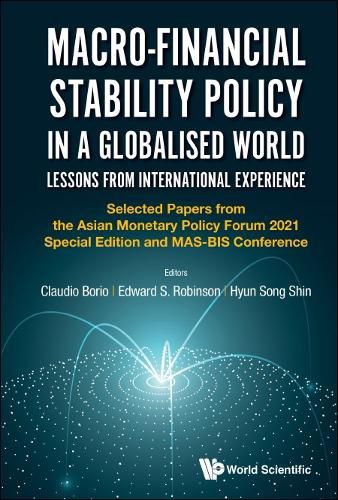Readings Newsletter
Become a Readings Member to make your shopping experience even easier.
Sign in or sign up for free!
You’re not far away from qualifying for FREE standard shipping within Australia
You’ve qualified for FREE standard shipping within Australia
The cart is loading…






This title is printed to order. This book may have been self-published. If so, we cannot guarantee the quality of the content. In the main most books will have gone through the editing process however some may not. We therefore suggest that you be aware of this before ordering this book. If in doubt check either the author or publisher’s details as we are unable to accept any returns unless they are faulty. Please contact us if you have any questions.
Since at least the Great Financial Crisis, authorities around the world have increasingly relied on macroprudential policy to help secure financial stability and complement monetary policy as an integral element of a broader macro-financial stability framework. In today’s interconnected global financial system, policy actions taken by the major advanced economies can have spillovers on the rest of the world through their impact on capital flows and exchange rates, potentially generating vulnerabilities across borders. Conversely, in emerging market economies, macroprudential policy as well as foreign exchange intervention and/or capital flow management policy can help mitigate the corresponding impact. This can in turn generate spillbacks on advanced economies - spillbacks that have become more sizeable as the emerging market economies’ heft in the world has grown. Yet little is known about these interactions.The contents of this book are based on a conference held on 26-28 May 2021 and jointly hosted by the Monetary Authority of Singapore (MAS) and the Bank for International Settlements (BIS). It aims to contribute to existing literature on macro-financial policymaking by providing an overall conceptual framework and documenting the latest global trends and country experiences. In particular, it highlights the role of international spillovers and spillbacks, paying particular attention to emerging market economies. This book is essential reading for academics, graduate students and economic professionals. It can also serve as a handbook for policymakers at central banks, regulatory authorities and other government agencies tasked with designing and implementing macroprudential or more generally macro-financial stability policies. The book will also be of interest to researchers at international organisations.
$9.00 standard shipping within Australia
FREE standard shipping within Australia for orders over $100.00
Express & International shipping calculated at checkout
This title is printed to order. This book may have been self-published. If so, we cannot guarantee the quality of the content. In the main most books will have gone through the editing process however some may not. We therefore suggest that you be aware of this before ordering this book. If in doubt check either the author or publisher’s details as we are unable to accept any returns unless they are faulty. Please contact us if you have any questions.
Since at least the Great Financial Crisis, authorities around the world have increasingly relied on macroprudential policy to help secure financial stability and complement monetary policy as an integral element of a broader macro-financial stability framework. In today’s interconnected global financial system, policy actions taken by the major advanced economies can have spillovers on the rest of the world through their impact on capital flows and exchange rates, potentially generating vulnerabilities across borders. Conversely, in emerging market economies, macroprudential policy as well as foreign exchange intervention and/or capital flow management policy can help mitigate the corresponding impact. This can in turn generate spillbacks on advanced economies - spillbacks that have become more sizeable as the emerging market economies’ heft in the world has grown. Yet little is known about these interactions.The contents of this book are based on a conference held on 26-28 May 2021 and jointly hosted by the Monetary Authority of Singapore (MAS) and the Bank for International Settlements (BIS). It aims to contribute to existing literature on macro-financial policymaking by providing an overall conceptual framework and documenting the latest global trends and country experiences. In particular, it highlights the role of international spillovers and spillbacks, paying particular attention to emerging market economies. This book is essential reading for academics, graduate students and economic professionals. It can also serve as a handbook for policymakers at central banks, regulatory authorities and other government agencies tasked with designing and implementing macroprudential or more generally macro-financial stability policies. The book will also be of interest to researchers at international organisations.